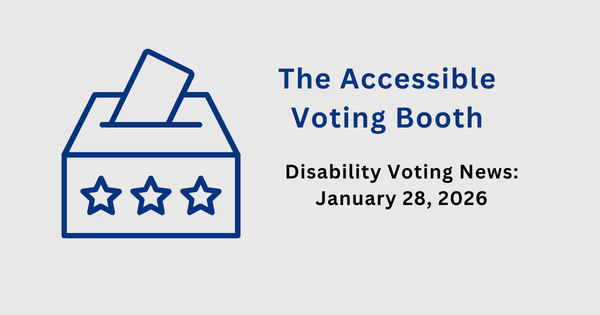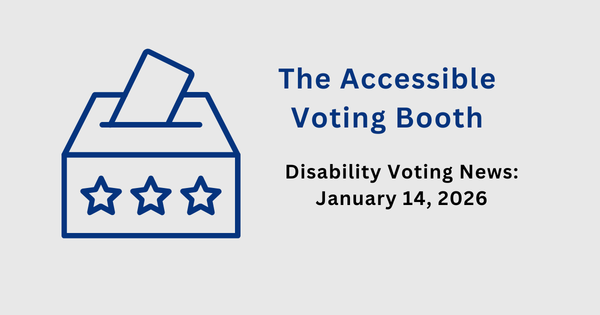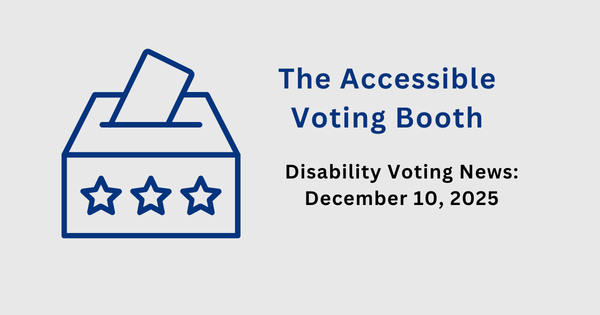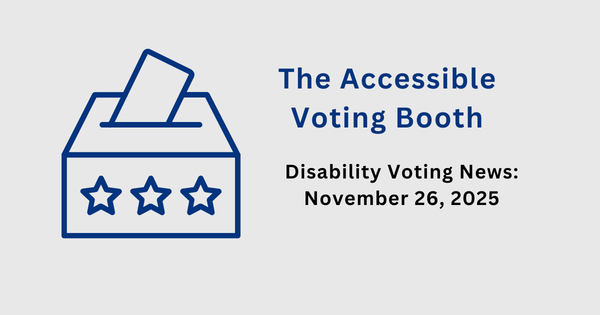Disability Voting News: May 14, 2025
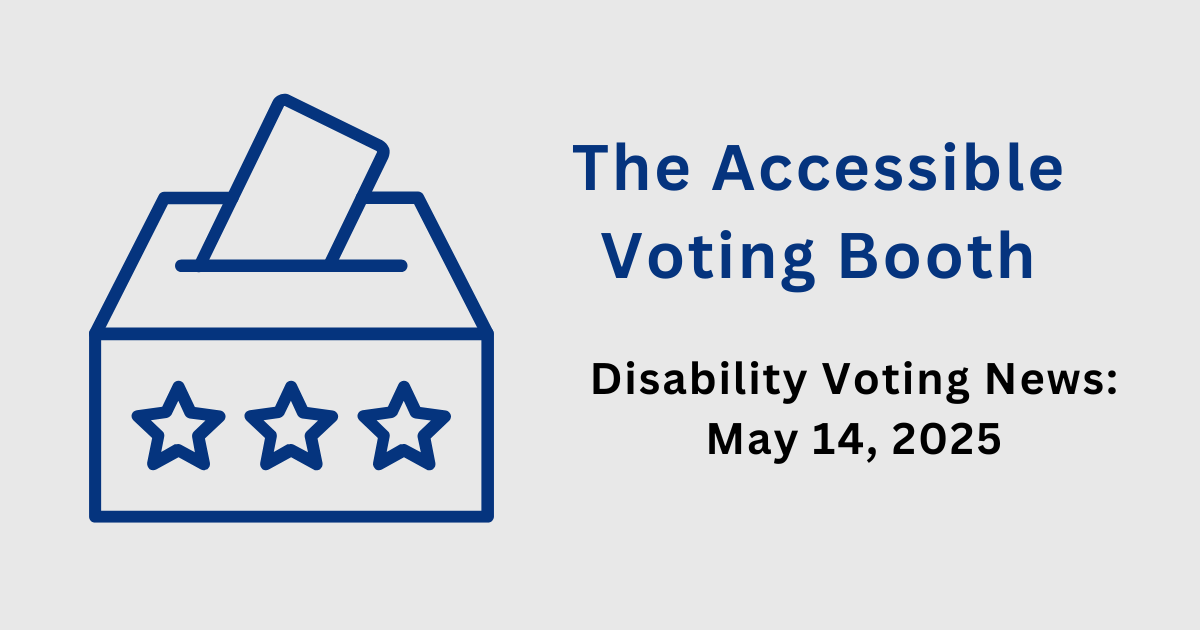
Welcome to The Accessible Voting Booth for May 14, 2025. This week, we’ll be talking about Texas legislation that aims to increase restrictions on voter assistance, Rhode Island’s legislation to expand permanent vote by mail, and Montana’s recently-enacted legislation to cut down on late and same-day registration. Plus I'm sharing (and resharing) two upcoming disability civic engagement events.
But before we get started, an Oliver update! Oliver is one of 15 finalists for Alexandria’s Cutest Pup competition. Please head over to this site to vote for Oliver–voting is open through May 19th, and you can vote once per day. You don't have to be an Alexandria resident to vote. Right now Oliver is in fourth place! If he wins, we’d love to draw attention to Mutts and Meows Rescue, the Texas rescue he came from. They are a foster-based rescue that pulls dogs and cats from the Houston shelters, opening up more spaces in the shelter system.
Houston is estimated to have more than one million stray dogs and cats. When they pull an animal from the shelter and put them in a foster home, that makes more room in the shelter system for another animal to be saved from the streets. Mutts and Meows adopts around the country and uses transports like Mighty Mutt Shipping to get pets like Oliver to their forever homes.

Texas considers legislation that would increase restrictions on providing assistance to voters (via Voting Rights Lab).
Texas Republican Ryan Guillen introduced HB 521 back in 2024, stating that this legislation aims to “improve accessibility for voters with disabilities while enhancing oversight of curbside voting.” However, this legislation would actually create new misdemeanors around curbside voting and assistance to voters with disabilities.
Currently, Texas law establishes that each polling place must designate a parking space for curbside voting and provide clear information on how to request assistance. Curbside voting is available during the early voting period and on Election Day to voters who are physically unable to enter the polling place.
HB 521 would introduce several new restrictions. Let’s talk through some of them.
It would require curbside voters to sign an oath affirming their need to vote curbside, and specify that curbside voting is available in only very limited circumstances. Voters who knowingly fail to complete the oath would be committing a misdemeanor. This could discourage people who need to use curbside voting from using it because they don’t feel “disabled enough” to meet the requirements or are judged as not eligible for using curbside voting.
Disability is not cut and dry. Someone may have a dynamic disability that makes it more challenging to enter the polling place one day, and easier to enter it another. A voter may be perceived as able to enter the polling place because their disability is not apparent, but that doesn’t mean that it is easy for them to enter the polling place. They might have an energy-limiting disability or mobility restrictions while not using an assistive device. And of course, we can’t consider the disability identity in a vacuum–multiply marginalized disabled voters, particularly voters of color and immigrants, may face greater scrutiny from poll workers due to unconscious or conscious bias.
HB 521 would change the requirements for persons who assist seven or more voters with transportation to the polls. They would be required to sign a form describing the nature of their assistance if they support seven voters with transportation across early voting and Election Day. Currently, assistors only have to sign a form if they are providing simultaneous transportation to seven or more voters. If they don’t sign the form, it’s a misdemeanor. Additionally, county clerks would be required to report these assistants to the Secretary of State.
This provision could have a chilling effect on organizations providing transportation to the polls. While the form isn’t new, I’m concerned with the requirement that county clerks report people and organizations providing transportation assistance to the Secretary of State, as well as the creation of misdemeanors for those who don’t fill out the form.
Lack of access to transportation is a major barrier to voting for millions of Americans, and only 61% of registered voters in Texas voted in the 2024 election. Texas is a massive state and many areas of the state do not have public transportation. 1 in 10 adults don’t drive, and only 65% of people with disabilities drive a car or other motor vehicle. Additionally, Texas only allows voters to vote absentee if they have a qualifying reason, such as being absent on Election Day or having a disability. Nonprofit organizations, rideshare services, and other groups often try to fill in the gaps in transportation access by providing rides to the polls. Providing transit to the polls isn’t a crime or a scheme, it’s something that organizations do to ensure that everyone can exercise their right to vote.
HB 521 would also modify rules for curbside voting. If there are at least four election officers at the polling place, at least two most assist a voter with curbside voting, and the election officer may not assist in marking the bill except in case of a physical disability that renders the voter unable to write and see or an inability to read the language in which the ballot was written. My greatest concern with this section is, again, whether election officials may decide a voter isn’t “disabled enough” to receive their assistance with marking their ballot. We know that poll workers can create access barriers to voting, especially when they are not properly trained to understand disability and how to properly assist voters with disabilities. A 2012 report by the National Council on Disability (which seems to have been taken down from the website) found in a survey of nearly 900 voters with disabilities that 25% of voters identified untrained poll personnel as a barrier.
HB 521 has passed out of its first chamber committee and continues on through the legislative process. While it is far from the most restrictive legislation currently being considered in Texas, it could potentially make curbside voting and providing transportation assistance to voters much more difficult, creating additional barriers to voting for people with disabilities.
Rhode Island House passes bill to expand access to permanent vote by mail (via Voting Rights Lab).
In Rhode Island, any voter can vote by mail. However, only voters who are indefinitely confined due to illness or infirmity or who are disabled can sign up for the permanent mail ballot list. Other voters must apply before each election, or if using the online registration system, they can apply for multiple elections at once.
Because voting doesn’t happen often, it can be easy to forget to apply for an absentee ballot, especially for local elections or primaries. If it isn’t convenient to go to a polling place, voters who forget to sign up may decide not to vote altogether. HB 5709 would make it much easier for voters by allowing them to sign up to automatically receive a mail ballot application prior to each election.
While permanent mail voting was already available to people with disabilities, the restrictions around who may sign up mean that many people with disabilities don’t qualify for the permanent mail voting list as it currently exists, as they may not feel “disabled enough” to use this option or have a disability that makes it challenging to go to the polls. This legislation will make it easier to vote by expanding the convenience of the permanent voting list to everyone regardless of disability status.
Montana Governor signs legislation to limit late and same-day registration (via Voting Rights Lab).
On May 5, Governor Greg Gianforte signed SB 490 into law. Prior to signing this legislation into law, late voter registration was available through the close of polls on Election Day, including on the Sunday before the election, with the exception of from noon to 5 p.m. on the day before the election. Under the new law, late registration would no longer be available for federal elections on the Sunday and Monday before the election, and same-day registration would only be available until noon on Election Day.
Research has found that states that have same-day voter registration have higher turnout rates for Black and Latino voters (between 2% to 17%), and that same-day registration increases turnout for voters between the ages of 18 to 24 between 3.1% and 7.3%. Same-day registration decreases administrative barriers to registration and ensures that more people can exercise their right to vote, especially if they find it challenging to travel to an election office or polling place. This legislation creates unnecessary barriers that will reduce voter registration and turnout. The American Civil Liberties Union notes that this legislation is similar to a law passed in 2021 that tried to eliminate election day voter registration but was ultimately struck down by the Montana Supreme Court.
Final Reminder: Register for the National Voting Access Summit: Building a Democracy for All
Join the National Polling Access Audit Coalition for a critical two-day summit about making voting more accessible for all. The National Voting Access Summit will bring together advocates, researchers, policy makers, and voting rights experts to discuss solutions to the challenges the disability community is experiencing in regards to voting access.
The summit will take place virtually on Zoom on Monday, May 19 and Tuesday, May 20 from 12-4 PM Eastern. American Sign Language interpretation and CART captioning will be provided. Register for the National Voting Access Summit.
Upcoming Disability Victory Training: Introduction to Lobbying
As many of you know, I co-lead Disability Victory, a 501(c)4 nonprofit on a mission to empower more disabled progressives to run for office, work on campaigns, and lead in their communities. We finally have a few trainings on the schedule (fundraising this year has been very challenging), including an upcoming training on lobbying with our board member Rebecca Lamorte!
Join us on Thursday, May 29 at 2:00 PM Eastern for Introduction to Lobbying. What is lobbying, who does it, and how can it make you a better lobbyist? Rebecca Lamorte is an experienced lobbyist who will break down how lobbying can influence the legislative process. You'll learn the basics of lobbying and how different groups can engage in lobbying, debunk myths about the practice, hear examples of how lobbying has been used to advance disability advocacy, and learn techniques and best practices.
This training is free and will have CART captioning and American Sign Language (ASL) interpretation. You can request additional accommodations upon registration or by emailing hello@disabilityvictory.org. Register for Introduction to Lobbying.
Thank you for reading this week’s edition of The Accessible Voting Booth! I’ll be back next week with more updates. As always, if you’d like to support the newsletter and my work, here’s how:
- Subscribe to the Accessible Voting Booth newsletter.
- Hire me! If you or someone you know is looking to hire a disability civic engagement expert, please reach out. I’m also available for communications and administrative work through my LLC, Landmark Virtual Assistance.
- Leave me a tip. Thank you for supporting my work!

